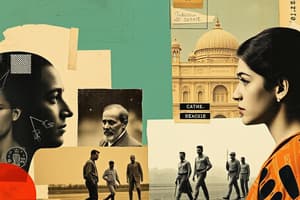Podcast
Questions and Answers
What does social stratification primarily refer to?
What does social stratification primarily refer to?
- The organization of individuals based on their economic resources and opportunities. (correct)
- The classification of individuals according to their family background.
- The grouping of individuals based on their age and gender.
- The categorization of individuals based on their educational qualifications.
Which of the following best describes a closed stratification system?
Which of the following best describes a closed stratification system?
- Individuals remain in the social class into which they are born with limited opportunities for change. (correct)
- Individuals can move between social classes based on personal achievements.
- Individuals can freely change their social roles within the system.
- Individuals have significant opportunities for upward mobility.
What characterizes the caste system in terms of social mobility?
What characterizes the caste system in terms of social mobility?
- Individuals can transition easily between different social stratums.
- Personal achievements play a significant role in social progression.
- Social mobility is strictly restricted and based on predetermined beliefs. (correct)
- Social mobility is encouraged and facilitated through education.
Which scenario exemplifies open stratification?
Which scenario exemplifies open stratification?
In a class system, what facilitates social mobility?
In a class system, what facilitates social mobility?
What is a defining characteristic of exogamous marriage?
What is a defining characteristic of exogamous marriage?
What does the term 'social positioning' encompass?
What does the term 'social positioning' encompass?
Which example indicates the impact of economic resources on social interactions?
Which example indicates the impact of economic resources on social interactions?
What is a primary cause of conflict as defined by Max Weber?
What is a primary cause of conflict as defined by Max Weber?
Which of the following is an example of ethnic conflict?
Which of the following is an example of ethnic conflict?
What is meant by 'negative peace'?
What is meant by 'negative peace'?
Which scenario best describes peace-keeping activities?
Which scenario best describes peace-keeping activities?
What is the definition of migration?
What is the definition of migration?
Which of the following best summarizes internal migration?
Which of the following best summarizes internal migration?
In the context of migration, what describes temporary migrants?
In the context of migration, what describes temporary migrants?
Which of the following instances reflects the impact of economic issues on internal conflicts?
Which of the following instances reflects the impact of economic issues on internal conflicts?
What does inclusive citizenship advocate for?
What does inclusive citizenship advocate for?
Which view of citizenship emphasizes dialogue and information exchange?
Which view of citizenship emphasizes dialogue and information exchange?
What characteristic is NOT associated with Non-Government Organizations (NGOs)?
What characteristic is NOT associated with Non-Government Organizations (NGOs)?
How is e-democracy typically characterized?
How is e-democracy typically characterized?
Which statement about the Network Society is true?
Which statement about the Network Society is true?
What aspect does the cosmopolitan view of citizenship include?
What aspect does the cosmopolitan view of citizenship include?
What is a notable effect of new media on journalism?
What is a notable effect of new media on journalism?
What is e-campaigning primarily used for?
What is e-campaigning primarily used for?
What is defined as a union where partners come from the same social class?
What is defined as a union where partners come from the same social class?
What does social mobility primarily refer to?
What does social mobility primarily refer to?
Which of the following best describes downward mobility?
Which of the following best describes downward mobility?
What is a characteristic of a meritocracy?
What is a characteristic of a meritocracy?
What type of feminism addresses the intersection of race, class, and gender?
What type of feminism addresses the intersection of race, class, and gender?
Which theory proposes solutions like wage increases to combat poverty?
Which theory proposes solutions like wage increases to combat poverty?
The system that favors male dominance within the family and society is known as what?
The system that favors male dominance within the family and society is known as what?
What aspect does social inequality primarily derive from?
What aspect does social inequality primarily derive from?
What is the primary process involved when new technology is introduced to meet societal needs?
What is the primary process involved when new technology is introduced to meet societal needs?
How does assimilation primarily affect individuals integrating into new societies?
How does assimilation primarily affect individuals integrating into new societies?
Which of the following is an example of cultural globalization?
Which of the following is an example of cultural globalization?
What is a significant consequence of climate change on human societies?
What is a significant consequence of climate change on human societies?
Which technology is highlighted as a sustainable solution to address climate change?
Which technology is highlighted as a sustainable solution to address climate change?
What is diffusion in the context of cultural change?
What is diffusion in the context of cultural change?
Which is NOT a type of globalization mentioned?
Which is NOT a type of globalization mentioned?
What is a primary reason for the need for immediate action to mitigate climate change effects?
What is a primary reason for the need for immediate action to mitigate climate change effects?
Which type of social movement primarily aims to align political systems with community ideals?
Which type of social movement primarily aims to align political systems with community ideals?
What does the concept of relative deprivation refer to?
What does the concept of relative deprivation refer to?
Which approach emphasizes the importance of organizational structure in the success of social movements?
Which approach emphasizes the importance of organizational structure in the success of social movements?
What characterizes new social movements?
What characterizes new social movements?
Which of the following is an example of a revolutionary movement?
Which of the following is an example of a revolutionary movement?
Flashcards
Social Stratification
Social Stratification
Categorizing people within a society, mainly based on economic resources and opportunities.
Closed Stratification
Closed Stratification
Social system where people stay in the same social class they're born into.
Open Stratification
Open Stratification
Social system where people have more options to change social classes.
Caste System
Caste System
Signup and view all the flashcards
Class System
Class System
Signup and view all the flashcards
Exogamous Marriage
Exogamous Marriage
Signup and view all the flashcards
Social Mobility
Social Mobility
Signup and view all the flashcards
Upward Mobility
Upward Mobility
Signup and view all the flashcards
Meritocracy
Meritocracy
Signup and view all the flashcards
Downward Mobility
Downward Mobility
Signup and view all the flashcards
Social Inequality
Social Inequality
Signup and view all the flashcards
Modernization Theory
Modernization Theory
Signup and view all the flashcards
Dependency Theory
Dependency Theory
Signup and view all the flashcards
What is social change?
What is social change?
Signup and view all the flashcards
What is an innovation?
What is an innovation?
Signup and view all the flashcards
Assimilation
Assimilation
Signup and view all the flashcards
Diffusion
Diffusion
Signup and view all the flashcards
Cultural Globalization
Cultural Globalization
Signup and view all the flashcards
Economic Globalization
Economic Globalization
Signup and view all the flashcards
Climate Change
Climate Change
Signup and view all the flashcards
How does climate change affect people?
How does climate change affect people?
Signup and view all the flashcards
Conflict (Weber)
Conflict (Weber)
Signup and view all the flashcards
Ethnic Conflict
Ethnic Conflict
Signup and view all the flashcards
Ideological Conflict
Ideological Conflict
Signup and view all the flashcards
Negative Peace
Negative Peace
Signup and view all the flashcards
Peace-Making
Peace-Making
Signup and view all the flashcards
Peace-Keeping
Peace-Keeping
Signup and view all the flashcards
Peace-Building
Peace-Building
Signup and view all the flashcards
Emigration
Emigration
Signup and view all the flashcards
Social Movements
Social Movements
Signup and view all the flashcards
Reform Movements
Reform Movements
Signup and view all the flashcards
Revolutionary Movements
Revolutionary Movements
Signup and view all the flashcards
Relative Deprivation
Relative Deprivation
Signup and view all the flashcards
Resource Mobilization Approach
Resource Mobilization Approach
Signup and view all the flashcards
Citizenship
Citizenship
Signup and view all the flashcards
Inclusive Citizenship
Inclusive Citizenship
Signup and view all the flashcards
Deliberative Views on Citizenship
Deliberative Views on Citizenship
Signup and view all the flashcards
Democratic View of Citizenship
Democratic View of Citizenship
Signup and view all the flashcards
Cosmopolitan View
Cosmopolitan View
Signup and view all the flashcards
Participatory Governance
Participatory Governance
Signup and view all the flashcards
Non-Governmental Organization (NGO)
Non-Governmental Organization (NGO)
Signup and view all the flashcards
Network Society
Network Society
Signup and view all the flashcards
Study Notes
Social and Political Stratification
- Social stratification categorizes individuals based on economic standing and access to resources.
- Factors influencing social positioning include race and economic background.
- Examples include Mila's social status from dining in prestigious restaurants, and Gab's leadership abilities.
Systems of Stratification
- Closed Systems: Individuals are confined to their birth social class with limited upward mobility.
- Example: A child from a farming family prioritizing financial contributions over education, potentially remaining in the same social class.
- Open Systems: Individuals have flexibility in social roles and interactions, with upward mobility facilitated by education and employment.
- Example: A college graduate pursuing additional qualifications to enhance career opportunities.
- Caste System: Rigid social structure where social movement is restricted, with faith and destiny determining social standing.
- Example: A young adult choosing not to pursue higher education due to predetermined beliefs about a degree's necessity for employment.
- Class System: Groups of people sharing similar backgrounds (income, education, occupation) experience social mobility through individual achievement.
- Example: Paul supporting his siblings' education, and Neil securing job opportunities for his cousin.
Types of Marriage
- Exogamous Marriage: Union between individuals from different social classes or nations.
- Endogamous Marriage: Union between individuals from the same social class or professional background.
Meritocracy
- System where individual status is based on performance and effort.
- Example: Elise securing a scholarship based on consistent good academic performance.
Social Mobility
- Movement of individuals within a stratification system.
- Influences social inequality and poverty.
- Upward Mobility: Progression to higher social class through career advancements, marriage, or similar circumstances.
- Example: A youth leader who transitions to a town councilor role.
- Downward Mobility: Descent to a lower social class due to economic setbacks, health issues, or educational discontinuity.
- Example: An outstanding employee taking leave due to health problems which negatively affects upward mobility.
Social Inequality
- Results from disparities in wealth, power, and social roles, leading to community divisions.
- Examples include instances of criminal activity (theft/scams) and unequal resource access.
Gender, Roles, and Feminism
- Gender Identity: Identification with specific roles and expectations based on sex.
- Patriarchy: System favoring male dominance in traditional family structures.
- Feminism: Advocacy for gender equality.
- Liberal: Focuses on addressing gender discrimination.
- Radical: Calls into question male-dominated power structures.
- Black Feminism: Highlights the intersection of race, class, and gender.
Global Stratification and Theories
- Modernization theory proposes solutions to poverty through wage increases and job opportunities.
- Dependency theory examines global poverty as a result of exploitation by wealthier nations.
- World Systems Theory studies economic relationships between countries.
- State-Centered Theories emphasize government intervention in economic development.
Social and Cultural Change
- Processes of change in social and cultural contexts.
- Innovation: Introduction of new ideas, methods, or technology to address societal needs and improve living conditions.
- Assimilation: Blending of cultures as individuals integrate into new societies, adapting to elements like food, laws, and hobbies.
- Diffusion: Spread of cultural elements/innovations across societies often facilitated by technology.
- Cultural Globalization: Spread of values, ideas, and practices, deepening social connections across the globe.
- Economic Globalization: Expansion of global trade and services fostering economic interdependence.
- Industrial Globalization: International expansion of global brands driven by social media and advertisements.
- Food Globalization: International popularity of dishes like pizza and spaghetti.
Challenges to Human Adaptation and Social Change
- Climate Change: Rise in average global temperatures causing changes in seasonal patterns.
- Effects on Societies: Global water resource scarcity, deforestation, and displacement of indigenous populations.
- Ethnic Conflicts: Conflicts arising from misunderstandings and disputes over resources.
- Example: Philippines vs. China dispute over the West Philippine Sea.
- Ideological Conflicts: Conflicts rooted in differing beliefs and worldviews.
Migration
- Definition: Movement of people for permanent residence.
- Types:
- Emigration: Leaving one's country to live abroad.
- Internal Migration: Movement within one's country.
- Permanent Migrants: Acquiring citizenship in another country.
- Temporary Migrants: Short-term relocation for specific purposes; e.g., workers.
- Refugees: Forced migration due to war or displacement.
Responding to Social, Political and Cultural Change
-
Citizenship: Legal status of individuals in a specific state enabling rights and protections.
-
Legal Status Examples: Behaviors and actions demonstrating legal expectations within a society.
-
Views on Citizenship:
- Inclusive Citizenship: Belief marginalized groups should not be restricted in their lives.
- Strict Parents: High expectations and control over children's actions.
- Deliberative View: Citizenship involving dialogue, information exchange, and decision-making.
- Democratic View: Citizenship limited to direct involvement in government or public events.
- Cosmopolitan View: Addressing local, national, and global concerns.
-
Participatory Governance: Involvement of citizens in decision-making processes.
-
Non-Government Organizations (NGOs): Organizations operating independently from government control; often involved in community initiatives.
-
Network Society: Impact of technology on societal interactions, including social media.
-
E-Democracy: Government or citizen activities using digital platforms like online voting.
-
E-Campaigning: Using digital platforms for political campaigns.
-
New Media: Digital platforms impacting journalism, and political engagement.
-
Social Movements: Organized efforts to induce change.
-
Reform Movements: Aimed at aligning political systems with community ideals.
-
Revolutionary Movements: Disregarding established norms aimed at major societal shifts.
-
Collective Behavior Approach: Examining social movements through behavior patterns of individuals involved.
-
Relative Deprivation: Dissatisfaction when expectations are not met.
-
Resource Mobilization Approach: Resource mobilization as a factor in the success of social movements.
-
Political Process Approach: Analyzing social movements based on external political environment.
-
New Social Movements: Social movements focused on neglected issues (e.g., same-sex marriage) .
Studying That Suits You
Use AI to generate personalized quizzes and flashcards to suit your learning preferences.




